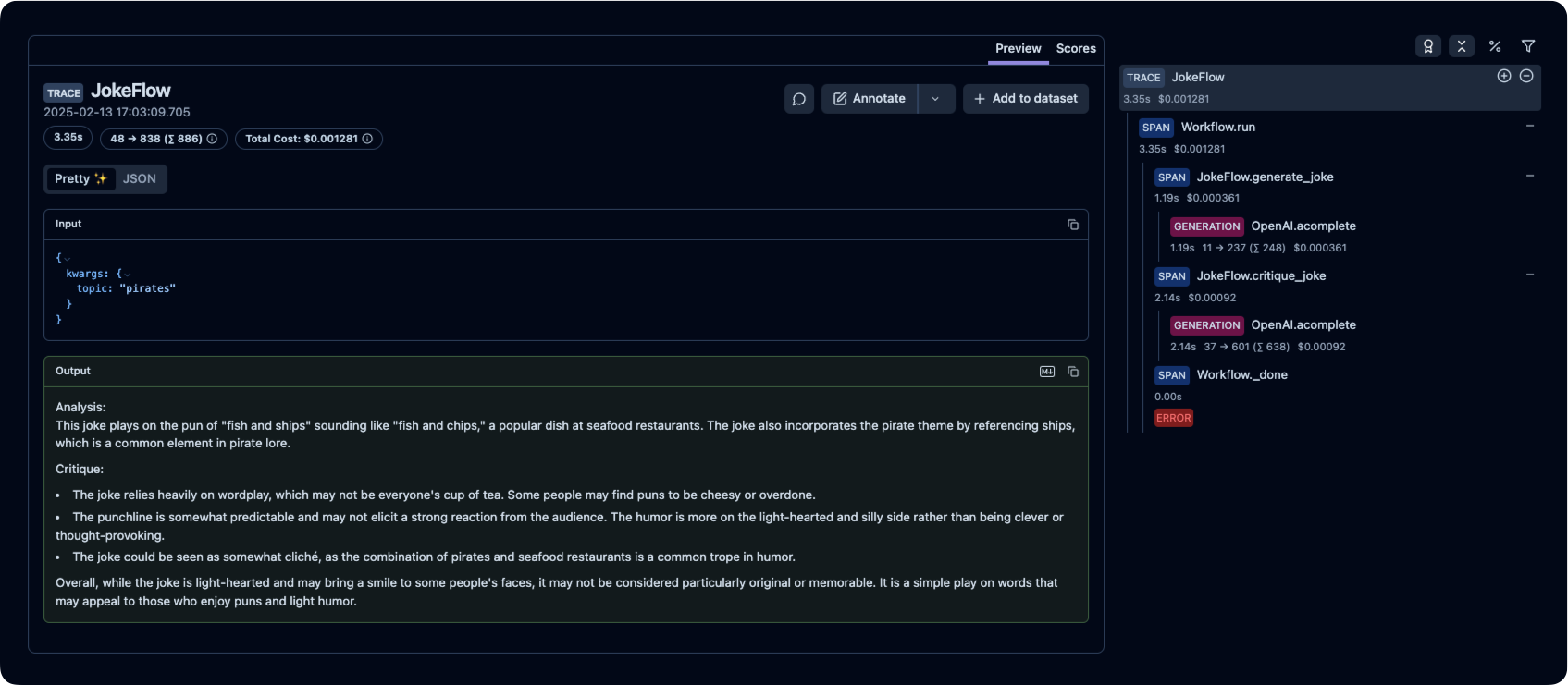Observability for LlamaIndex Workflows
This cookbook demonstrates how to use Langfuse to gain real-time observability for your LlamaIndex Workflows.
What are LlamaIndex Workflows? LlamaIndex Workflows is a flexible, event-driven framework designed to build robust AI agents. In LlamaIndex, workflows are created by chaining together multiple steps—each defined and validated using the
@stepdecorator. Every step processes specific event types, allowing you to orchestrate complex processes such as AI agent collaboration, RAG flows, data extraction, and more.
What is Langfuse? Langfuse is the open source LLM engineering platform. It helps teams to collaboratively manage prompts, trace applications, debug problems, and evaluate their LLM system in production.
Get Started
We’ll walk through a simple example of using LlamaIndex Workflows and integrating it with Langfuse.
Step 1: Install Dependencies
%pip install langfuse openai llama-index-workflows llama-index-core llama-index-llms-openai openinference-instrumentation-llama_index llama-index-instrumentationStep 2: Set Up Environment Variables
Configure your Langfuse API keys. You can get them by signing up for Langfuse Cloud or self-hosting Langfuse.
import os
# Get keys for your project from the project settings page: https://cloud.langfuse.com
os.environ["LANGFUSE_PUBLIC_KEY"] = "pk-lf-..."
os.environ["LANGFUSE_SECRET_KEY"] = "sk-lf-..."
os.environ["LANGFUSE_BASE_URL"] = "https://cloud.langfuse.com" # 🇪🇺 EU region
# os.environ["LANGFUSE_BASE_URL"] = "https://us.cloud.langfuse.com" # 🇺🇸 US region
# Your openai key
os.environ["OPENAI_API_KEY"] = "sk-proj-..."With the environment variables set, we can now initialize the Langfuse client. get_client() initializes the Langfuse client using the credentials provided in the environment variables.
from langfuse import get_client
langfuse = get_client()
# Verify connection
if langfuse.auth_check():
print("Langfuse client is authenticated and ready!")
else:
print("Authentication failed. Please check your credentials and host.")
Step 3: Initialize LlamaIndex Instrumentation
Now, we initialize the OpenInference LlamaIndex instrumentation. This third-party instrumentation automatically captures LlamaIndex operations and exports OpenTelemetry (OTel) spans to Langfuse.
from openinference.instrumentation.llama_index import LlamaIndexInstrumentor
# Initialize LlamaIndex instrumentation
LlamaIndexInstrumentor().instrument()Step 4: Create a Simple LlamaIndex Workflows Application
In LlamaIndex Workflows, you build event-driven AI agents by defining steps with the @step decorator. Each step processes an event and, if appropriate, emits new events. In this example, we create a simple workflow with two steps: one that pre-processes an incoming event and another that generates a reply.
from llama_index.core.llms import ChatMessage
from llama_index.llms.openai import OpenAI
from typing import Annotated
from workflows import Workflow, step
from workflows.events import StartEvent, StopEvent
from workflows.resource import Resource
def get_llm(**kwargs):
return OpenAI(model="gpt-4.1-mini")
class MyWorkflow(Workflow):
@step
async def step1(
self, ev: StartEvent, llm: Annotated[OpenAI, Resource(get_llm)]
) -> StopEvent:
msg = ChatMessage(role="user", content=ev.get("input"))
response = await llm.achat([msg])
return StopEvent(result=response.message.content)
w = MyWorkflow()response = await w.run(input="Hello, what is Langfuse?")
print(response)Step 5: View Traces in Langfuse
After running your workflow, log in to Langfuse to explore the generated traces. You will see logs for each workflow step along with metrics such as token counts, latencies, and execution paths.

Note: To add additional trace attributes like tags or metadata or use LlamaIndex Workflows together with other Langfuse features please refer to this guide.
Interoperability with the Python SDK
You can use this integration together with the Langfuse SDKs to add additional attributes to the trace.
The @observe() decorator provides a convenient way to automatically wrap your instrumented code and add additional attributes to the trace.
from langfuse import observe, propagate_attributes, get_client
langfuse = get_client()
@observe()
def my_llm_pipeline(input):
# Add additional attributes (user_id, session_id, metadata, version, tags) to all spans created within this execution scope
with propagate_attributes(
user_id="user_123",
session_id="session_abc",
tags=["agent", "my-trace"],
metadata={"email": "user@langfuse.com"},
version="1.0.0"
):
# YOUR APPLICATION CODE HERE
result = call_llm(input)
# Update the trace input and output
langfuse.update_current_trace(
input=input,
output=result,
)
return resultLearn more about using the Decorator in the Langfuse SDK instrumentation docs.
Troubleshooting
No traces appearing
First, enable debug mode in the Python SDK:
export LANGFUSE_DEBUG="True"Then run your application and check the debug logs:
- OTel spans appear in the logs: Your application is instrumented correctly but traces are not reaching Langfuse. To resolve this:
- Call
langfuse.flush()at the end of your application to ensure all traces are exported. - Verify that you are using the correct API keys and base URL.
- Call
- No OTel spans in the logs: Your application is not instrumented correctly. Make sure the instrumentation runs before your application code.
Unwanted observations in Langfuse
The Langfuse SDK is based on OpenTelemetry. Other libraries in your application may emit OTel spans that are not relevant to you. These still count toward your billable units, so you should filter them out. See Unwanted spans in Langfuse for details.
Missing attributes
Some attributes may be stored in the metadata object of the observation rather than being mapped to the Langfuse data model. If a mapping or integration does not work as expected, please raise an issue on GitHub.
Next Steps
Once you have instrumented your code, you can manage, evaluate and debug your application: